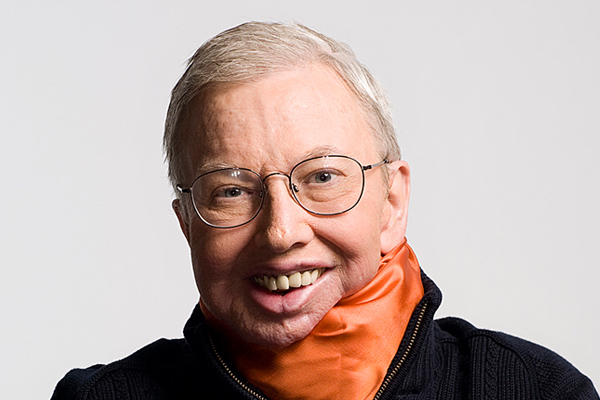
photo: chris strong
Roger Ebert in 2008.
My memory of Roger Ebert revolves around my work with him on his acceptance speech for the 2011 Chicagoan of the Year award, bestowed on him by my magazine, Chicago. His passing yesterday reminded of the time I spent with him working on that story.
Like most journalists—like most everyone, really—I was in awe of his writing talent and of his intellect. But I was most bowled over by his own personal journey—from prickly movie reviewer to a deeply thoughtful, wise, sensitive soul, full of humanity, humor, wit, and grace, all of which was generously articulated in his award-winning blog, which I (and @whet) read religiously.
When we made the decision to honor him, I wasn’t sure whether he’d even accept. The guy had won every award in the book, after all, including the Pulitzer. He was an international celebrity, often more famous than the people he wrote about. I was wrong.
From the start, he was not only delighted, but thrilled. One concern was his acceptance speech. Would he have his beloved wife, Chaz read it? Would he sit at his table? No. He wanted to go up to the mike and have a recorded voice deliver it. After interviewing him for my write-up, I worked with Ebert to convert his speech from text into the voice provided by my Mac laptop ("My voice, Alex, comes installed on ALL Macs,” he told me.)
I was impressed by how seriously he took it all (he inserted pauses for laughter in his text, made several revisions, mostly miniscule, and sent me ever-more-urgent emails as the date approached and I didn't respond immediately.) The most interesting thing, however, was sitting at his table and “chatting” with him before and during the ceremony. When I would ask a question or make a comment, he would whip out a small notebook and a pencil and scribble an answer that would invariably be either witty, biting, insightful, hilarious—or all of the above.
We talked about the state of the business—he was furious about his own newspaper, the Sun-Times, and its short-lived decision to no longer endorse political candidates. (The heat came through every pencil scratch.) He also lamented the sad state of print journalism, his lifelong love and passion, and worried about its future.
Though he, of course, had long ago lost his voice, I was amazed at how much he could communicate his emotions, feelings, and mood—joy, disapproval, irritation, mirth, boredom, skepticism, delight—with little more than his eyes and eyebrows. One of my favorite memories was my saying something that cracked him up (I can't remember what it was) but his eyes brightened, he jotted something in his notebook, and held it up for me to see. It was a smile face with an exclamation point.
I loved that moment, as I loved his Chicagoans of the Year speech that day, a blend of humility and humanity that clearly moved the audience, even as it made them laugh. He returned to my table clearly pleased with himself—and with the entire event, a fact confirmed by a whisper to me from Chaz. She told me, to my surprise, how much being named a Chicagoan of the Year meant to him. Oh, how he loved Chicago, she said. And how Chicago loved him.



